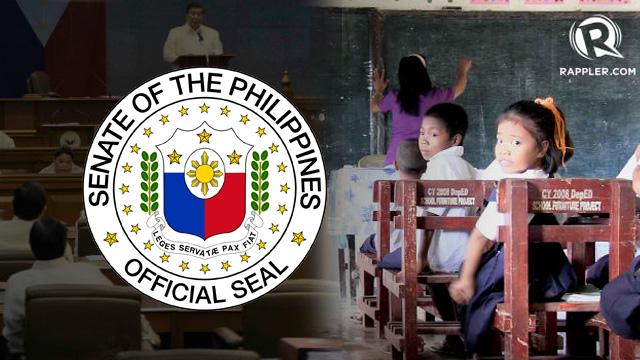
MANILA, Philippines - During the first day of the Education Summit hosted by the Department of Education (DepEd), Commission on Higher Education (CHED) and Technical Education and Skills Development Authority (TESDA), Senator Bam Aquino, chair of the committee on education, presented some of the proposed policies he hopes will be enacted in 2017. (READ: Education stakeholders to gather for Education Summit in 2016)
The two-day summit attended by about 500 education stakeholders on Thursday and Friday, November 4 to 5, also aims to gather inputs for the education agenda of the Duterte administration and the new Philippine Development Plan (2017-2022).
One of the proposed measures, Senate Bill 0172 or the Abot-Alam (Knowledge Within Reach) Bill, aims to institutionalize the alternative learning systems in the country, the program which Education Secretary Leonor Briones also wants to become one of the major legacies of the Duterte administration.
It aims to give the out-of-school youth, those who are at risk of dropping out or those who were not able to get their elementary and high school diplomas, a chance to get quality education.
Under the bill, a targeting system called the Barangay Abot Alam Targeting System will be established, allowing the government to “know the total percentage of out-of-school youth in the country and where they are.”
It will enable the government to map all the programs related to solving the challenges of the out-of-school youth to ensure cohesiveness and efficiency among different sectors.
A program matching system will also be established to give out-of-school youth “equal access to programs and services of partner agencies and institutions.”
Aquino said that this will be among the first bills that will be passed in his committee.
Trabaho Centers in Schools Act
Another bill that Aquino hopes the Senate will pass in 2017 is the Senate Bill No. 170 or the Trabaho Center in Schools Act.
As a follow-through on the K to 12 program, Trabaho Center, a job placement office, will be established. The office aims to provide the following:
- Career counseling services which will guide students on what career track they will pursue
- Employment facilitation which will assist senior high students on resume writing, pre-employment seminars, and job fairs
- Industry matching which will provide graduate listings and resume profiling of students to companies
- A database of job opportunities in different localities
“We’re pushing for this bill because my take is that the ability of our senior high schools to produce employable graduates is probably one of the most important indicators of the success of the K to 12 system,” Aquino said.
“If at the end of the senior high school process and you graduate Grade 12, you have 40% entering college and entering the tertiary level, you have about 50 to 55% who took the tech-voc track and that 55% are still unemployed, then that puts the whole system into question,” he added.
Aquino said that if the bill is passed, the first graduates of senior high school will be able to avail of the services provided by the act.
“This is probably, according to Secretary Diokno, going to cost a lot of money, but we feel that this is an important piece to really complete the K to 12 promises for our youth,” Aquino added.
Scholarships for the underprivileged
Aquino also said he is pushing for a more accessible tertiary education, especially for the underprivileged.
“We will be pushing for more support for the poorest of the poor to be able to get the scholarships that they need in our [State Universties and Colleges] SUCs, maybe even in our private tertiary level institutions and support for our youth in terms of a tuition fee scholarship,” Aquino said.
The support includes miscellaneous, living, and travel expenses. Aquino said that while these are already being provided by CHED, there is still a need to augment such support.
2017 budget highest
Budget Secretary Benjamin Diokno announced during the summit that the proposed 2017 budget allocated P650 billion ($13.4 billion) for education.
The education sector gets the biggest chunk of the country’s national budget, as mandated by the 1987 Constitution. According to Diokno, the proposed budget is the largest that has ever been proposed, saying that it is “three times as large as the national budget 10 years ago,” and is 30% higher than the previous budget.
The proposed P567-billion ($11.7 billion) budget for DepEd, which is the biggest item in the national budget, will be financing the recruitment of new teachers, construction and improvement of 47,500 classrooms, the upgrading of teaching skills, and the acquisition of learning materials.
Tertiary education, on the other hand, has a proposed budget of P75 billion ($1.5 billion), 22% higher than the previous allocated budget, according to Diokno. Majority will be given to CHED and SUCs.
Meanwhile, TESDA will get P6.9 billion ($142 million), which is P10 million ($206,861.55) higher than this year’s allocated budget, Diokno said.
The proposed budget, which has already been approved in the House of Representatives will be presented to the Senate this week, according to Diokno.
Given the huge increase in the education budget, Aquino said that the problem now is how to utlize it so that it will be felt by the students.
"The challenge that we have now is really to be able to synergize the macro-policies, the budgets that we’re allocating (which are tremendous and huge) and the very micro, the very real, the very palpable concerns of our schools all over the Philippines… the challenge now is to execute.” – Rappler.com
$1 = P48.34